

PM of Bangladesh Calls for Global South to Stop Paying Debts. The Chair of the Climate Vulnerable Forum, HE Sheikh Hasina, Honorable Prime Minister of Bangladesh, released the following statement following the release of the 6th Assessment Report of the IPCC’s first working group: Statement in Response to Sixth Assessment Report of IPCC, 2021 The latest IPCC report has come as a clarion call for the entire world.
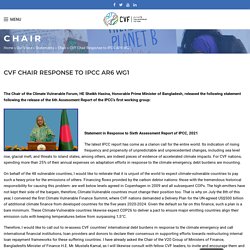
Global Declaration Enshrines Housing as a Right, not a Commodity. Photo: Picasdre – Wikimedia Commons Amsterdam has signed up to a global declaration to the United Nations which states that ‘housing must first and foremost be considered as a right, not a commodity’ in order for cities to survive.

The initiative, launched by Barcelona’s outspoken mayor Ada Colau, says that segregation and real estate speculation are two of the issues which must be tackled to ensure cities meet the human rights needs of their inhabitants. China & the EU Sign Circular Economy MOU. China and the European Union (EU) have signed a memorandum of understanding (MOU) on the circular economy at the 20th EU-China Summit, held in Beijing 16-17 July.
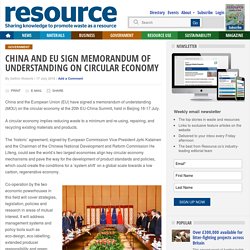
A circular economy implies reducing waste to a minimum and re-using, repairing, and recycling existing materials and products. The ‘historic’ agreement, signed by European Commission Vice-President Jyrki Katainen and the Chairman of the Chinese National Development and Reform Commission He Lifeng, could see the world’s two largest economies align key circular economy mechanisms and pave the way for the development of product standards and policies, which could create the conditions for a ‘system shift’ on a global scale towards a low carbon, regenerative economy.
California Hits Emissions Targets Years Early. Easter Island Reduces the Time Tourists can Stay. Norway the first Scandinavian Country to Decriminalise Drugs. Maritime CO₂ to be Regulated for First Time. Carbon dioxide from ships at sea will be regulated for the first time following a historic agreement reached after two weeks of detailed talks in London.
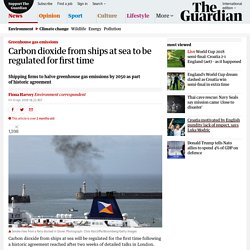
Shipping companies will halve their greenhouse gas emissions by 2050 under the plan, brokered by the International Maritime Organization and binding across its 170 member states. The agreement will require a revolution among ships, which are overwhelmingly fuelled by heavy oils at present. In future, they will have to not only be more energy-efficient, but also make use of cleaner energy, in the form of batteries supplying electricity, solar and wind electricity generation, and perhaps even a return to sail in some cases, or more controversially to nuclear power, as some warships already use. Environmental campaigners said the plan was not enough given the urgency of tackling climate change, though they welcomed the deal, which has taken decades of work. German Cities to Trial Free Public Transport. “Car nation” Germany has surprised neighbours with a radical proposal to reduce road traffic by making public transport free, as Berlin scrambles to meet EU air pollution targets and avoid big fines.
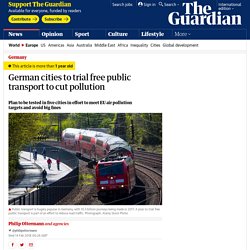
The move comes just over two years after Volkswagen’s devastating “dieselgate” emissions cheating scandal unleashed a wave of anger at the auto industry, a keystone of German prosperity. “We are considering public transport free of charge in order to reduce the number of private cars,” three ministers including the environment minister, Barbara Hendricks, wrote to EU environment commissioner Karmenu Vella in the letter seen by AFP Tuesday. “Effectively fighting air pollution without any further unnecessary delays is of the highest priority for Germany,” the ministers added. The proposal will be tested by “the end of this year at the latest” in five cities across western Germany, including former capital Bonn and industrial cities Essen and Mannheim.
China Opens Up City Roads for Driverless Cars. Drivers in Beijing, beware: soon, you’ll be driving alongside autonomous vehicles.
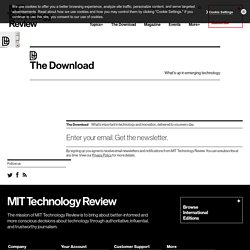
On Monday, Beijing’s Municipal Commission of Transport announced (Chinese) provisional regulations for testing self-driving cars on city roads. Companies that are registered in China and have tested self-driving cars in enclosed spaces can now apply for permission to test their vehicles on Beijing’s bustling roads. It certainly won't be the first city in Asia—or the rest of the world—to embrace autonomous vehicles: self-driving startup nuTonomy already operates in Singapore, and several U.S. cities are home to the cars of Uber, Waymo, and others. But the news is the latest sign of China’s commitment to making autonomous vehicles a reality, in hopes of alleviating congestion on city streets and becoming a leading technology power. China’s tech companies and carmakers have been waiting for this to happen. 'Political Watershed' as 19 Countries Pledge to Phase Out Coal. A new alliance of 19 nations committed to quickly phasing out coal has been launched at the UN climate summit in Bonn, Germany.
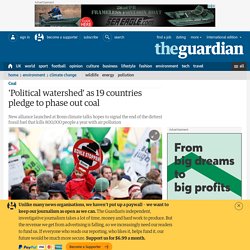
It was greeted as a “political watershed”, signalling the end of the dirtiest fossil fuel that currently provides 40% of global electricity. New pledges were made on Thursday by Mexico, New Zealand, Denmark and Angola for the Powering Past Coal Alliance, which is led by the UK and Canada. “The case against coal is unequivocal,” said UK climate minister Claire Perry, both on environmental and health grounds – air pollution from coal kills 800,000 people a year worldwide. “The alliance will signal to the world that the time of coal has passed.” San Francisco, Oakland to Sue Major Oil Companies. Caltrans Begins Modifying California Roads for Self-Driving Cars. Google's Waymo added 100 self-driving Chrysler Pacifica Hybrid minivans in 2016.
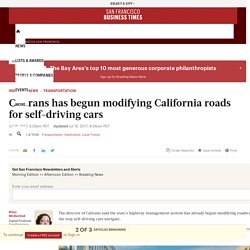
Waymo The director of Caltrans said the state's highway management system has already begun modifying roadways to accommodate the way self-driving cars navigate. “The automated vehicles (AVs) can follow lane lines,” Caltrans Director Malcolm Dougherty told KPCC Southern California Public Radio. Trending: The most expensive East Bay homes sold in 2017. Sweden Officially Starts Using Blockchain to Register Land & Property. Lantmäteriet, the land registry of Sweden, officially started to utilize Blockchain technology to register land and properties.

Since early 2017, various countries including Brazil have begun to utilize Blockchain technology to facilitate the ownership of land and properties in a decentralized, transparent and immutable network. In an interview with Computer Weekly, Mats Snäll, Lantmäteriet’s head of development, revealed that the Swedish land registry has been actively investing in Blockchain technology and developing a proof-of-concept Blockchain platform since 2016.
In March of this year, Lantmäteriet completed the initial phase of trials of its Blockchain-based land and properties registry platform. Snäll said: “When we heard about Blockchain and its supposed benefits, we wanted to explore whether this is an actual next-generation technology we could use for registries. San Francisco Considers Taxing Robots. Germany Allows Self-Driving Cars on its Roads, with a Driver. Add Germany to the list of places where businesses can test their self-driving cars on the open road -- as long as they have a driver sitting at the wheel ready to take control at any time.
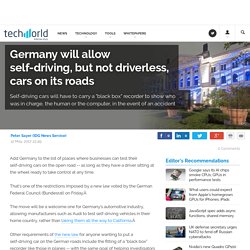
That's one of the restrictions imposed by a new law voted by the German Federal Council (Bundesrat) on Friday. The move will be a welcome one for Germany's automotive industry, allowing manufacturers such as Audi to test self-driving vehicles in their home country, rather than taking them all the way to California.Â. EU Parliament Calls for Robot Law; Rejects Robot Tax. AeroFarms Partners with 100 Resilient Cities. May 9, 2017 AeroFarms Partners with 100 Resilient Cities, Rockefeller Foundation to Increase Food Security and Fight Climate Change AeroFarms is proud to announce a partnership with the Rockefeller Foundation’s 100 Resilient Cities initiative.
Norway Becomes First Country to Commit to Zero Deforestation. Norway has become the first country in the world to commit to zero deforestation. The Norwegian parliament’s Standing Committee on Energy and the Environment made the pledge in a recommendation on the government’s Action Plan on Nature Diversity. The committee requested that the government “impose requirements to ensure that public procurements do not contribute to deforestation of the rainforest.”
The committee also requested that the government protect biodiversity through a new policy and the investments made by the Norges Bank Investment Management, which manages Norway’s Government Pension Fund Global. Barcelona’s Passes Rules to Deliver Sustainable Tourism.
France Mandates Green Roofs for New Builds. A new law recently passed in France mandates that all new buildings that are built in commercial zones in France must be partially covered in either plants or solar panels. Green roofs, as they are called, have an isolating effect which helps to reduce the amount of energy needed to heat a building during the winter or cool it in the summer. They are capable of retaining rainwater and reducing problems with runoff, and also offer birds a place to call home in the urban jungle. French environmental activists originally wanted to pass a law that would make the green roofs cover the entire surface of all new roofs. However, partially covered roofs make for a great start, and are still a huge step in the right direction. French Introduce Laws to Define Appliance Lifespan. It is news that will cheer anyone who has struggled to get a vacuum cleaner, fridge or TV repaired only to be told it’s probably cheaper to buy a new one.
A new government decree in France is forcing manufacturers to tell consumers how long their appliances will last. French companies will also have to inform consumers how long spare parts for the product will be available, or risk a fine of up to €15,000 (£11,000). And if this wasn’t enough, from next year faulty products – whether it’s mobile phones to washing machines – will have to be repaired or replaced for free within two years of being purchased.